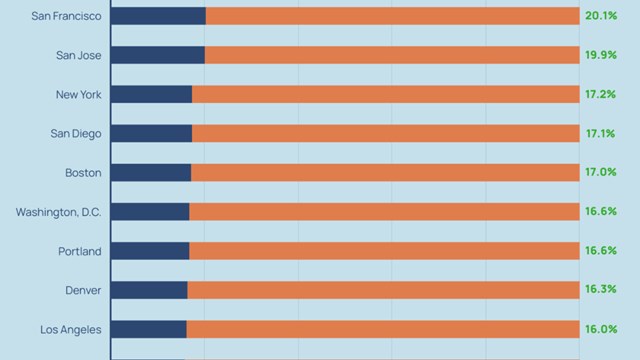
Money matters are important to any homeowner, putting much pressure on those board members in charge of creating a budget—no easy task. Within a budget, condo boards and associations must try to predict expenses for the upcoming year, including maintenance, construction or any unforeseen variables. Associations must also worry about specific reserve budgets in order to avoid special assessments.
"The best strategy for budgeting is history—to know what happened in the past," says Karen P. Sackstein, a certified public accountant based in Fair Lawn who specializes in working with associations. "It's also important to have current contracts going forward so you know what all costs will be. You also need to not be too stringent because things out of the ordinary do come up."
According to Gary Sherman, CPA, with Rosenberg Rich Baker Berman & Company, with offices in Bridgewater and Maplewood, the majority of the numbers that appear in the budget come from costs that the association had the year before. However, a past budget is not the only factor that should be considered in creating a new budget. Those making the decisions are given the difficult tasks of figuring and projecting.
All Things Created
When it's time for your board to create your HOAs budget for the year, it's a good idea to start earlier rather than later. "The budget process should begin about three to four months before the association's year end," says David L. Ferullo, CPA with The Curchin Group in Red Bank. It's also important to include all of the necessary individuals in the decision making process. "At a minimum, it should include members of the board of trustees, finance committee and its management company. Or, if self managed, its property manager."
Members of other committees such as landscaping, recreation and facilities can also be involved, and unit owners themselves are also not completely left out of the process in some cases.
"Some associations require that you need a majority of unit owner approval to pass the budget but some don't," Sackstein says. "Some have a caveat that says boards need approval if there's a large increase, but it really depends on the bylaws and what they say."
The process of putting the budget together will normally consist of a number of meetings held during the budget process period. Generally it will consist of a planning phase, gathering phase, processing phase, review phase and final approval phase.
"The normal first step is to get accurate year-to-date figures and estimate what the balance of the year will bring," says Jules Frankel, CPA, MBA, with the accounting firm of Wilkin & Guttenplan P.C. in East Brunswick. "Then you look at the numbers and look at what changes you know will occur the next year, like insurance or landscaping, and you plug those in and look at deferred maintenance and replacement funding. That allows you to crunch the numbers and figure out what your new budget should be."
Money Matters
Of course, one of the first things that comes to mind when one hears the word "budget" is money, and how to save it. There are several possible moves to consider when trying to lower costs for residents.
"Two of the best strategies that a board can have for reducing costs are competitive bidding and effective monitoring of expenditures," Ferullo says. "However when competitive bidding is used, it is important that the board provides all bidders the same bid requirements to insure that all proposals will be similar with respect to the goods and or services to be provided. Also, it is important to realize that the lowest bidder may not always be the best choice, and at the same time the highest bidder may be."
Sherman adds that the effective monitoring of expenditures is equally important. "A careful review of actual expenditures in prior years provides those preparing the budget with a good basis for the new budget; a history of how much prices have increased and any changes in the quantity of the product or service being provided," he says.
"You have to know your community and you don't want to put things in the budget just to create a wish list," Sherman says. "You need to do your research and make sure you are not missing anything."
A majority of services such as landscaping, snow removal and management are provided through contracts. Where possible, multiple year contracts can also be a source of containing costs.
It's In There
The budget generally consists of two areas. The first involves the general operating expenditures of the association. These consist of general and administrative, buildings and grounds, utilities and recreational costs. The other is capital replacement and other restricted fund transfers.
"It is especially important that the association budget contains an amount to be transferred to the capital replacement fund in accordance with its governing documents," Ferullo says. "Other items a board needs to consider when preparing its budget is handling of operating deficits or surpluses, the need to budget allowances for uncollectible assessments and under-funded capital replacement reserves."
Even small items need to be budgeted for. If the homeowners say they want flowers or some new landscaping, or something for the common areas, those things need to be added to the budget.
When looking at your budget, you will need to determine where prices will go in the upcoming year and figure out future costs. This information can come from a variety of different resources. Past budgets and prior period actual expenditures are good starting points, however care should be taken to insure that current events have not had a significant impact on current costs or services required.
What's happening in the world around us can have an effect on the budget because if prices are going up on materials, or insurance rates are skyrocketing in the state, the rising costs need to be taken into account.
"The biggest impact we are seeing is the oil crisis," Frankel says. "It has created a situation where energy costs in certain types of associations have gone up significantly. More significantly is replacement costs have gone up with items that are petroleum-based."
In Reserve
The capital replacement fund—often called the reserve fund—is a significant part of the budget for most associations.
"The association's governing documents generally require an annual amount be set aside based on a reserve study included in the association's public offering document or based on an updated study," Ferullo says. "Engineering firms are engaged to perform reserve studies that detail the common elements of the association, their replacement costs and estimated useful lives."
From this information the engineering firms provide the association with a report that includes the amount of the annual replacement fund to be included in the association's budget. These reserve studies are then updated every three to five years to insure the amounts being transferred for major projects in the association are adequate.
Keep in mind, no matter how much pre-planning is done for a budget, not every expense is always 100 percent predictable. So what happens in those cases when an unplanned expense occurs that is not covered in the budget?
"You can do a special assessment," Frankel says, "if it's an item that you must spend money on right now, today. If you have a terrible winter and you budgeted an amount for snow removal and it's double that, the logical thing is to special assess."
More Money, More Money
It's not very common, but some associations might wind up with an operating surplus at the end of the year. When this occurs, the board must evaluate the cause of the surplus and determine how they intend to utilize it.
"We recommend generating good will in the association by giving a free month [of maintenance fees] around the holiday time," Sackstein says. "It doesn't happen much, though."
Operating surpluses can also be used to reduce the subsequent year's budget or transferred to the capital replacement fund to cover under-funding. It can also be used for capital additions, provided such expenditures meet any prior approval of the unit owners as set forth in the association's governing documents.
"Large operating surpluses will generally result in unit owners questioning them and call for reductions in assessments," Ferullo says. "They can also cause income tax issues if not handled properly."
Mistakes to Avoid
A new budget is required every year, and for those just beginning with the process, mistakes will happen. Some of the most common budgeting mistakes are not budgeting for deficits for fear of raising assessments, not budgeting for uncollectible unit owner assessments, a failure to recognize changing economic conditions and a failure to adequately fund reserves.
"One of the most common mistakes that people make is not increasing the budget in any given year," Sackstein says. "Even if you've contained your costs and done all your careful planning and have excess in the budget for unexpected expenses, it should increase every year for cost of living. It's easier for unit owners. You don't want to keep budget the same for five years and then have a 20 percent increase."
Keep in mind that history will always be your best guide for planning a yearly budget, but don't forget to consider expenses that only come up every few years.
Keith Loria is a freelance writer and sports reporter living in Larchmont, New York.






Leave a Comment